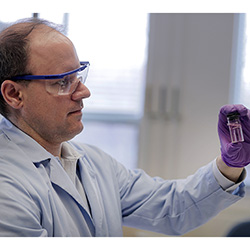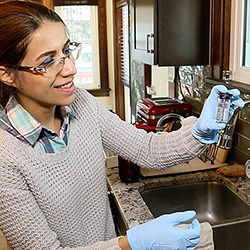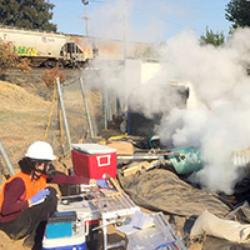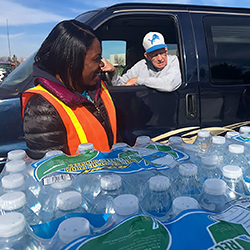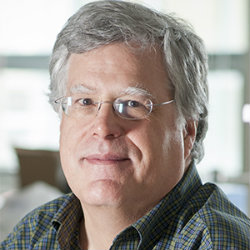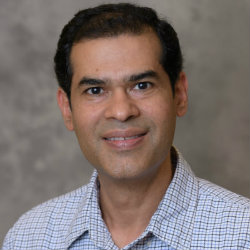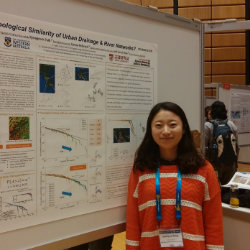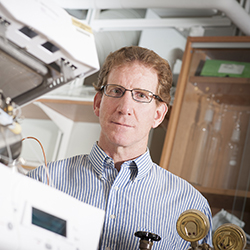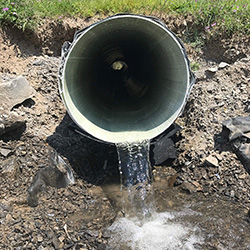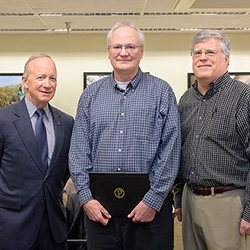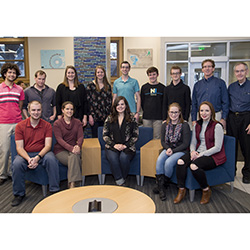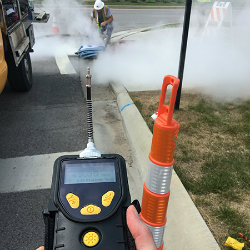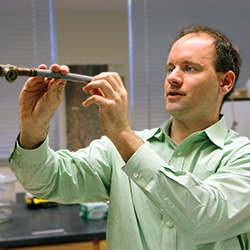Environmental Engineering
With only one world to live in, environmental engineers are helping make sure we handle it with care. The skills of environmental engineers are
becoming increasingly important as we attempt to protect the fragile resources of our planet. Students in Environmental Engineering will have the
opportunity to apply science and engineering principles to improve the environment, water, air and land.
In Civil Engineering you can prepare for a great future with an environmental engineering career that offers a remarkable opportunity to positively affect the quality of life in our communities, our country, and our planet. Check out the Environmental Engineering area and join in on the excitement! You will have opportunities for research and education in a wide range of issues, including remediation of contaminated soils and sediments, industrial and solid waste treatment, water and wastewater treatment, air pollution measurement and control, urban and agricultural air and water quality management, understanding the environmental fate of pollutants, and sustainable engineering. Other options are also available through the
Division of Environmental and Ecological Engineering.
Our Environmental Engineering faculty have leadership roles and participate in numerous national and campus centers and institutes. We offer flexible academic options and research opportunities in our top
environmental facilities for undergraduate students, as well as MS and PhD graduate degree programs. The Purdue Air & Waste Management Association also offers opportunities for student involvement in the advancement of environmental knowledge.
Spotlights
April 13, 2020
While restaurants, gyms, schools and other buildings are closed indefinitely to prevent the spread of COVID-19, water left sitting in pipes could change in quality. It's possible that water left sitting for long periods of time could contain excessive amounts of heavy metals and pathogens concentrated in pipes nationwide, say researchers who have begun a field study on the impact of a pandemic shutdown on buildings.
February 19, 2020
Is the water in your home actually safe, given that water utility companies in the U.S. aren't required by law to monitor the water that specifically enters a building at its service line? A study has found that the water quality of a home can differ in each room and change between seasons, challenging the assumption that the water in a public water system is the same as the water that passes through a building's plumbing at any time of the year.
November 22, 2019
Communities across the U.S. rely on drainage culverts to keep roadways safe. While these buried structures cross streams and divert water from roadways, many are in need of repair. Unexpected culvert failures can disrupt traffic, damage the environment and nearby property, and can even be fatal. Two popular methods used to repair damaged culverts are called spray-on lining and cured-in-place-pipe (CIPP) lining. Both practices involve the outdoor manufacture of a new plastic liner – at the existing culvert. Because both practices bring raw chemicals onsite, environmental contamination, fish kills, and downstream drinking water contamination has occurred. Potentially hazardous conditions can be also created near the worksite during the plastic manufacture repair process, the research shows.
June 17, 2019
In response to the 2018 Camp Fire that caused large-scale damage to public and private drinking water systems across Butte County, California, Associate Professor of Civil Engineering and Environmental and Ecological Engineering Andrew Whelton will lead a pair of events next week to inform the public on tips for better drinking water and plumbing.
December 5, 2018
One hundred thousand residents of Flint, Michigan, could use water only from bottles or filters during a years-long lead contamination crisis, which started when the city switched to a new drinking water source in 2014. As part of a class assignment that grew into a case study, Purdue University researchers found that during the first three weeks of the disaster alone, anywhere from 31 to 100 million bottles were generated as waste. This means that Flint should have been buried in plastic by the time the crisis ended in 2017.
November 30, 2018
On Dec. 11, Lyles Family Professor of Civil Engineering Chad Jafvert was inducted into the University's Book of Great Teachers - honoring outstanding teaching faculty who have demonstrated sustained excellence in the classroom.
Held every five years, the induction ceremony will take place at 3:30 p.m. in Purdue Memorial Union's South Ballroom President Mitch Daniels and Provost Jay Akridge will speak at the event.
November 12, 2018
A paper published by faculty and grad students in the Lyles School of Civil Engineering has garnered the Editors' Choice Award from Water Resources Research. The award is given to about 1% of published articles in any calendar year.
November 12, 2018
A paper published by a PhD student and faculty in the Lyles School of Civil Engineering has garnered the Editors' Choice Award from Water Resources Research. The award is given to about 1% of published articles in any calendar year.
October 20, 2018
Suresh Rao studies failure. Specifically, he examines failures of the infrastructure networks that provide critical services to cities. By examining breakdowns and recoveries in urban infrastructure, he and his team are learning how to design and operate cities better — and help urban communities become more resilient. Rao, Professor of Civil Engineering and the Lee A. Rieth Distinguished Professor of Environmental Engineering, views cities as complex systems, a conglomeration of engineered networks (utilities, power grids, roads), the institutions that manage them, and the communities that expect their demands to be met reliably and affordably.
September 17, 2018
The methods for implementing safe water supplies in developing countries might also apply to the Carolinas during Hurricane Florence, says a Purdue University water supply and sanitation expert. Ernest Blatchley III, Professor of Civil Engineering and Environmental and Ecological Engineering, has led teams in the Dominican Republic that have installed water treatment systems within a day or two by investigating a few key characteristics of the community.
August 8, 2018
Purdue University researchers have developed a method to detoxify water with chlorine and ultraviolet radiation, which may provide new hope for water-stressed areas and help promote the reuse of wastewater. The Purdue team developed a method for selectively degrading and detoxifying amines, organic compounds derived from ammonia that are common in water supplies. Amines include a number of compounds that can be toxic to humans and other animals.
May 15, 2018
An in-depth review of environmental protections for a common storm water culvert repair practice — cured-in-place pipe repair, or CIPP — has revealed differing installation practices across states, water contamination incidents in 10 states and Canada, and lack of safety data for existing installation practices.
April 11, 2018
President Mitch Daniels on Monday (April 9) surprised Larry Nies, professor of civil engineering and environmental and ecological engineering, with a One Brick Higher Award to thank him for his heroic work in helping save the life of a colleague earlier this year.
January 26, 2018
CE grad student Peyman Yousefi has been awarded the Andrews Environmental Travel Grant in support of his graduate research. This highly competitive and prestigious award, which was established to support research focused on improving the world environment, supports travel for research relating to the environmental issues.
December 8, 2017
A group of Purdue students in partnership with the Rotary Club of Lafayette are preparing to go Wednesday (Dec. 13) to the Dominican Republic to work on a project implementing water treatment systems.
July 31, 2017
New research is calling for immediate safeguards and the study of a widely used method for repairing sewer-, storm-water and drinking-water pipes to understand the potential health and environmental concerns for workers and the public.
July 1, 2017
Dr. Chad Jafvert, Professor of Civil Engineering and Environmental and Ecological Engineering at Purdue University, was recently awarded the Association of Environmental Engineering and Science Professors (AEESP) Outstanding Publication Award for his influential 1992 paper "Reaction Scheme for the Chlorination of Ammoniacal Water." The award is a commendation for a "landmark environmental engineering and science paper that has withstood the test of time and significantly influenced the practice of environmental engineering and science."
May 31, 2017
Chad Jafvert, Professor of Civil Engineering and Environmental and Ecological Engineering, has been named a Purdue University Teaching Academy Fellow, one of 12 faculty inductees for 2017.
March 6, 2017
You know that sharp odor of chlorine from the swimming pool you can recall from earliest childhood? It turns out it's not just chlorine, but a potent brew of chemicals that form when chlorine meets sweat, body oils, and urine. Prof. Blatchley offers his insight in this NPR health news article.
February 2, 2017
Low-flow building water systems designed to conserve water pose potential health hazards because they may cause an increase in disease-causing organisms and harmful chemicals. A new EPA-funded project led by Purdue University strives to help solve the problem.
